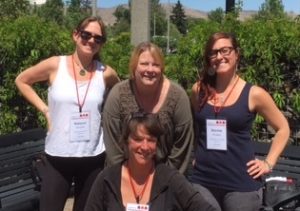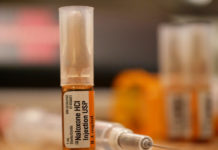Addiction treatment in Olympia, Washington has been assisted by a local mental health agency dedicated to giving the people of Thurston County a chance to find the right form of substance abuse treatment.
The Capital Recovery Center, which was started in 1989, is a not-for-profit public community agency that offers assistance to Olympia residents. They provide direction for people to find the right avenue for addiction treatment and peer-to-peer support.
Capital communicates with their clients, mainly Thurston County residents, to find a solution for their addiction treatment needs in the hopes that they can prevent tragedy. There were 106 opioid-related deaths in Thurston County from 2012 to 2016, according to the Washington State Department of Health.
Capital offers two types of main programs, Projects for Assistance in Transition from Homelessness (PATH) and PEER Support, which offers peer recovery services.
“Our superpower is that we are all peers,” said Meta Hogan, manager of the PATH Program. “We’ve all been there, we know from experience that everyone has their own approach to recovery. We know that recovery isn’t a strictly linear process and we’re willing to work with someone wherever they’re at with recovery.”
PATH is an outreach and engagement program for the homeless population who experience a mental health challenge.
“PATH is designed to connect with these individuals, develop trust, assess their needs, and refer them to appropriate mental health, housing, primary care services,” Hogan said.

(Photo Provided by Meta Hogan)
She also explained that, last year, the federal government allocated funding for a state targeted response (STR) to address the opioid epidemic and the state redirected a portion of the money to singular PATH programs to hire and train PEER Pathfinders.
“The STR program goals are to connect opiate users with medication-assisted treatment, housing, employment and medical insurance,” she said.
The original grant, instituted on March 1, 2017 amounted to more than $11 million per year for two years. The total was determined based on grant approval, according to the Washington State Department of Social and Health Services. The report indicated that the grant allocation covered over $9 million for addiction treatment and over $2 million for prevention.
Along with grant money, Hogan highlighted that having the trained peer pathfinders, who have experienced addiction, is beneficial to helping people in the area by providing assistance throughout their recovery progress.
“We help people think through what their recovery could look like,” she said. “[We] connect them with local resources and supports that fit their goals. We provide supplies like bus passes, shower and laundry vouchers, hygiene supplies, naloxone, and fentanyl test kits.”
Hogan indicated that some of the outcomes she would like to see through this program include expanded access to a variety of recovery supports including medication-assisted treatment and harm reduction models.
She also hopes that guiding patients to the right addiction treatment program will lead to a decrease in drug-related deaths.
Hogan said that clients who enter their facility usually come in by direct outreach, provider referrals or voluntarily.
“Depending on a potential client’s willingness and ability to engage, the process of enrollment can take a few minutes or a few weeks,” she said. “We aren’t a clinical treatment program, so enrollment looks different for everyone. Some of our clients check in every few days, and some we don’t see for months at a time.”

















